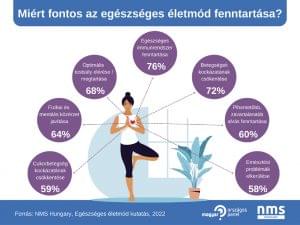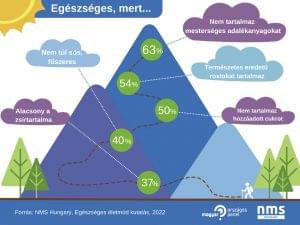Magazine: Eat smartly! – An overview of health-conscious eating

Guest writer:
Attila Seres
client service manager
NMS Hungary
Our company has conducted a representative, 500-respondent online survey in its Hungarian National Panel about the healthy eating trend, and how it influences people – are they willing to make changes in their diets to eat more healthily?
Is it trendy to follow a healthy diet?
Nearly three quarters of respondents said: it is more than medium important for them to eat healthily. What motivates them to do so? 76% said keeping their immune system healthy, and 72% named reducing the risk of cardiovascular diseases and cancer. 68% mentioned having optimal body weight and 62% said feeling better physically. The majority of the survey’s participants revealed that for them a healthier diet means drinking enough (69%), but every other respondent mentioned eating enough fruit and vegetables, and following a diverse diet.
What does healthy eating actually mean?
Every fourth person has fruit and vegetables on a daily basis, but it is more typical to eat these only weekly. People try to have white meat several times a week, together with low-fat dairy products and foods rich in fibre. Only 40% of consumers eat fish and they do it monthly or even less often. 63% said healthy food doesn’t contain artificial additives, 54% find high fibre content important, and 50% want no added sugar in groceries.
Four from 10 survey participants spoke about some kind of dietary restrictions, for instance 11% said they are sensitive to lactose and 4% said the same about gluten. 12% are affected by diabetes and 27% have other health reasons to be careful about what they put on their plate. Only 2% said they are vegetarian and 2% are vegan. Interestingly enough we found that consumers following a special diet eat fruit, vegetables, fibre-rich and low-fat food, white meat, nuts and fish as frequently as people without health-related restrictions.

COVID’s influence
Against our expectations, the coronavirus pandemic only had a small influence on the healthy eating habits of the survey’s participants. However, vitamin consumption and its frequency have increased significantly. 100% said they have noticed the recent elevation of food prices, and this had a negative influence on the healthy eating efforts of 71% of consumers. 48% admitted that they only buy certain groceries when they are in promotion. In general we can say that the importance of following a healthy diet doesn’t stand firmly on its two feet. As prices are rising, an ever-bigger part of households’ monthly budget will be spent on food. How will shoppers react to this? Will the weight, importance and relevance of certain product groups change in stores? What will disappear from the shopping baskets?

//
A growing product selection

Roland Kanyó
marketing and PR manager
dm
Recently we have added free-from snack products to our assortment. We monitor consumption trends in Austrian and German dm stores for new ideas. Free-from and functional products are definitely the way to go right now. These days shoppers are checking out the list of product ingredients. Various cereal drinks are getting popular, together with sweet and salty snacks, breakfast products, to-go foods and family-sized products. //
Building on trends and feedback
About 6% of ALDI’s product selection consists of free-from products. The direction of our innovation work is shaped by consumption trends and customer feedback. Demand has definitely jumped for special products – healthy and free-from foods. We are waiting for shoppers with ALDI’s own ‘Natur Aktiv’, ‘Just Veg!’ and ‘Enjoy Free!’ products, plus groceries that we sell on a temporary basis, and freshly baked and pre-packaged free-from baked goods. //
Decisions based on surveys

Tamás Kámán
purchasing director
Tesco Magyarország
Recently we have conducted a survey, according to which 53% of shoppers choose healthy or sustainable products because of health reasons, 33% buy them as part of a health-focused lifestyle and 32% would like to lose weight. Based on these findings we have decided to upgrade our healthy product selection and made 200 new products available to customers. Shoppers can choose from altogether 1,000 organic, protein-enriched, vegan and vegetarian, free-from, low-carb, low-salt and low-fat products. //
Conscious and price-sensitive shoppers

Márk Maczelka
head of communications
SPAR Magyarország
SPAR regularly reviews its healthy product selection and new products are added based on the latest trends and consumer needs. Sales of these foods are growing year after year, as people are increasingly conscious about what they are eating, how big the given product’s ecological footprint is and whether it was made in Hungary or not. It is also true that shoppers are price-sensitive in this product category too. //
Vegans can choose from a wide range of products

Judit Tőzsér
head of corporate communications
Lidl Magyarország
Lidl Magyarország’s experience is that much more shoppers are looking for free-from, organic and vegan products in shops than before. As the popularity of plant-based products is on the rise, we offer a growing selection of these to customers, such as various spreads rich in fibres, vitamins and minerals, plant-based drinks and yogurts, and plant-based meat alternatives, e.g. tofu. We also sell vegetarian and vegan bakery items and ready meals such as vegan pizza. //
A strategic area

Ildikó Varga-Futó
communications
and CSR director
Auchan
For Auchan the category of products related to the health-consciousness trend is a strategic area, so we keep monitoring shopper needs and shape our product selection accordingly. Recently we have improved our fresh product offering. In addition to lactose-free products, vegan foods such as meat substituting cold cuts, ready-to-cook meals, sandwich spreads and cheese are also very popular nowadays. Healthy products have their own separate section in Auchan stores. //
Growing free-from segment and stagnating organic products

Tímea Tulkán
head of commercial activities
METRO
About two or three years ago we expanded our organic product selection: back then this segment was growing dynamically, but later a period of stagnation commenced. On the contrary, the free-from product market has changed very much recently, as formerly those shoppers purchased these who were forced to do so, but today following a trend can also be the reason. Plus the sustainability trend has put meat alternatives in the limelight. //
Related news
High-value shopping basket and more conscious shoppers: growing demand for domestic and healthy products
🎧 Hallgasd a cikket: Lejátszás Szünet Folytatás Leállítás Nyelv: Auto…
Read more >Related news
II. Green Gastronomy – Marketing Communication Workshop organized by the MMSZ HoReCa and Green Section
🎧 Hallgasd a cikket: Lejátszás Szünet Folytatás Leállítás Nyelv: Auto…
Read more >Retail sales of organic products in Hungary increased by 13.9% – our country is the second fastest growing market in the European Union
🎧 Hallgasd a cikket: Lejátszás Szünet Folytatás Leállítás Nyelv: Auto…
Read more >






